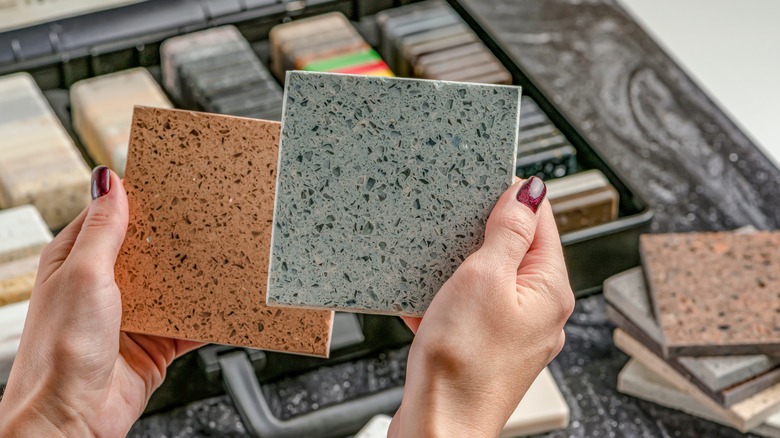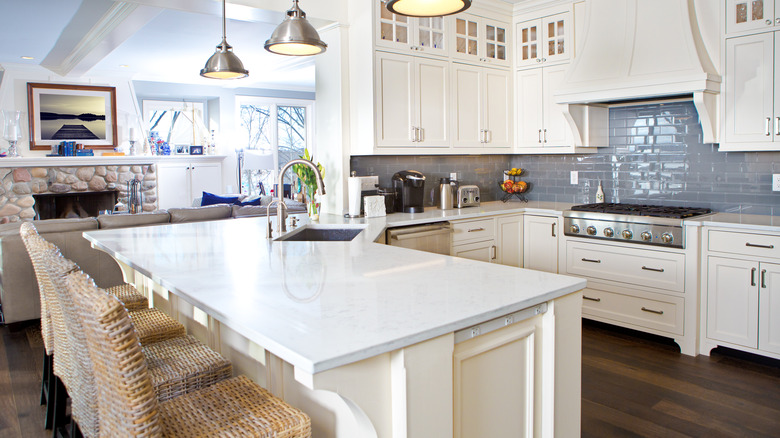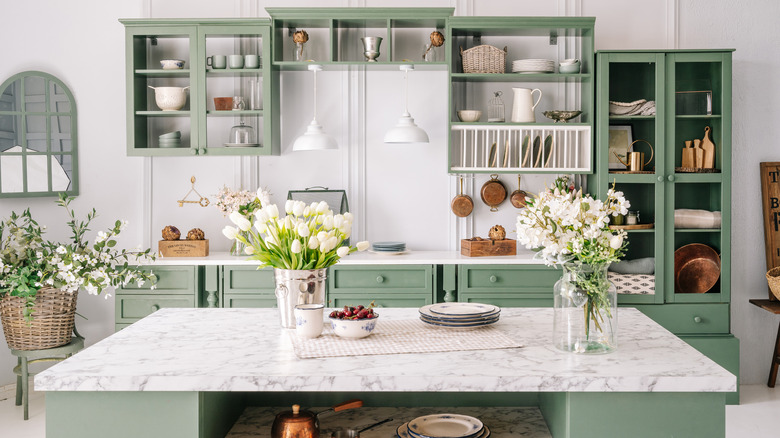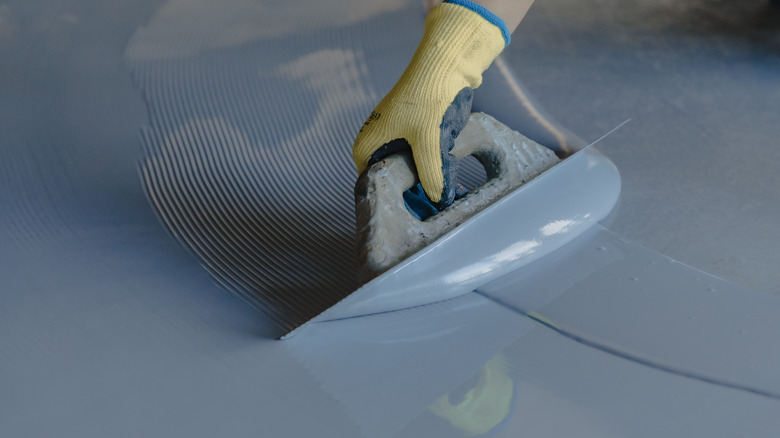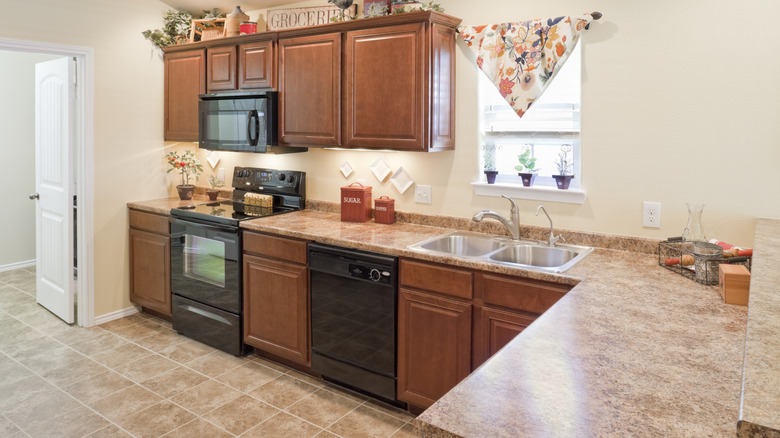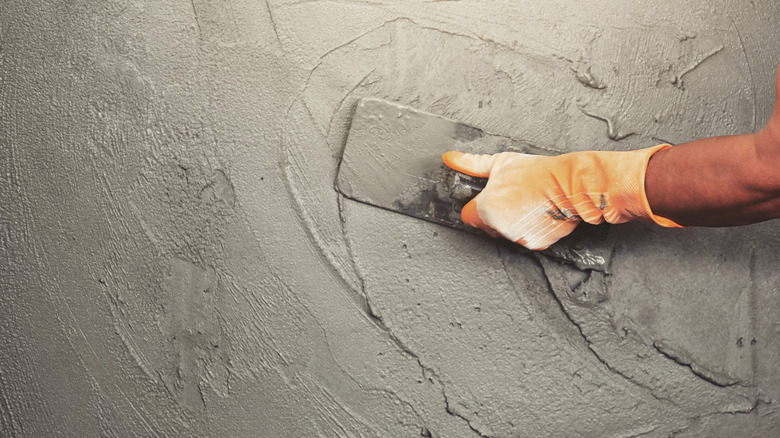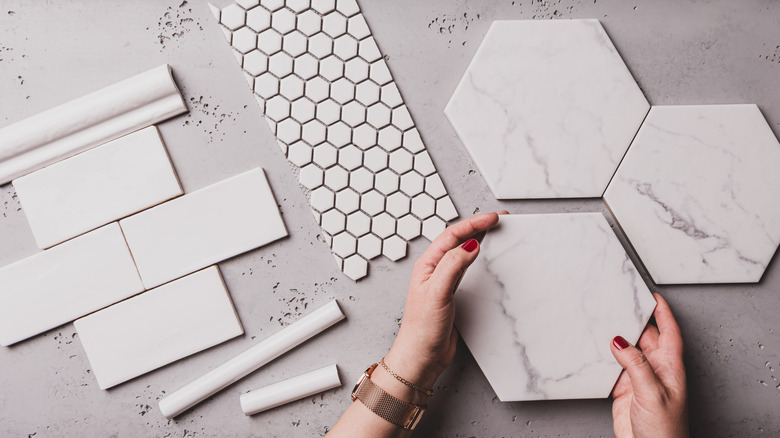Countertop Choices Your Favorite HGTV Stars Would Warn Against
As homeowners, we all want to make renovation choices that will add value as well as enhance the overall aesthetic appeal. When choosing a countertop, it's important to not only pick what is visually appealing but also to consider durability, maintenance requirements, and overall functionality. And, who better to take advice from than your favorite HGTV stars? Luckily, everyone from Chip Gaines to Erin Napier has weighed in on their opinions regarding countertop materials.
You may think that cost-saving material is a win or that luxury countertops will boost your home's value. However, some of the most popular choices have some downsides, and some of the most seasoned experts warn against using them. By making an informed decision, you can choose a material that will add form, function, and value to your home. So, let's take a closer look at some countertops that HGTV stars would advise against so you can avoid making costly mistakes.
White countertops
Renovation experts Erin and Ben Napier, renowned for their HGTV show "Home Town," are no strangers to challenging restoration projects. In Season 7, Episode 3, titled "New-Stalgic Restoration," they take on the task of reviving a neglected Victorian home. Ben comments on the possibility of the house being demolished and how rare it is to find historic Victorians in Laurel, Mississippi. Fortunately, the property is rescued by three local siblings who are determined to transform it into a beloved family retreat.
While picking out materials for the kitchen renovation, Erin Napier advises against using white countertops during kitchen restoration despite their popularity in design. "I'm so tired of seeing slabs of white," she voices candidly. "It would feel really out of synchronicity to put a countertop like that in a house from 1900." Erin chooses a granite countertop with rich brown and cream swirls. The other surfaces in the kitchen also veer away from white, including the creamy tile backsplash and the cabinets coated with Restoration by Sherwin-Williams, a warm greige. By avoiding trendy but mismatched elements, she ensures that the renovated space respects the home's heritage while accommodating modern sensibilities.
Marble countertops
Marble countertops, revered for their elegance and timeless appeal, often dominate interior design trends. While marble exudes luxury and sophistication, its durability and maintenance requirements make it a less-than-ideal choice in busy households. Its susceptibility to staining and etching can be problematic in high-traffic areas such as kitchens and bathrooms.
In Season 6, Episode 1 of HGTV's "Celebrity IOU," supermodel and America's Got Talent judge Heidi Klum candidly expresses her disdain for marble countertops, calling them "dumb." Jonathan Scott of the Property Brothers echoed her sentiment, emphasizing the drawbacks of marble countertops. "So many people are like, 'I need real marble imported from Italy,' and I'm like, 'You get a glass of water, it stains,'" Jonathan remarked, shedding light on the material's susceptibility to stains and damage. Heidi concurred, expressing frustration with the inevitable consequences of using marble. "It always stains," she lamented. "Hate that!"
Marble is porous and easily absorbs liquids, leading to stains from everyday household items. Even with proper maintenance, it is vulnerable to damage and requires meticulous care to preserve its appearance. Jonathan reassured Heidi that quartz countertops are a practical alternative to marble. Homeowners can opt for materials like quartz or granite that offer comparable beauty with superior resilience.
Epoxy countertops
Epoxy countertops may be a popular choice among homeowners due to their versatility. But, it's essential to note that they may not be as heat-resistant as some other materials, like granite or quartz, which are better suited for high-temperature environments. If you're considering epoxy countertops for your home, it's essential to weigh the pros and cons carefully. While they offer many benefits, they may not be the best choice for everyone, especially those who require a highly heat-resistant surface. In an Instagram video for Good Housekeeping, Jonathan Scott expressed his reservations about epoxy countertops, noting, "It never lasts." He emphasized that the appearance deteriorates further as the epoxy begins to peel away.
Additionally, epoxy countertops require regular maintenance to keep them looking their best. They are prone to scratches and staining, which can make them look unattractive and dull. In addition to the maintenance requirements, installing epoxy countertops can be a complicated DIY project that requires skill and patience. Mistakes during installation can be difficult to correct, which can result in costly repairs and a less attractive final product.
Laminate countertops
The Property Brothers also caution against using laminate countertop options."Yes, laminate is cheaper, but in many cases, you can actually take value away from a house by installing it," Jonathan explained to HGTV. Drew echoed this sentiment, advising homeowners to consider laminate only as a last resort. "If you have no other choice, at least get a laminate that's printed to look like stone. But make it a last resort," he emphasized.
Laminate countertops lack the longevity of other materials like granite or quartz. They are prone to scratching, chipping, and staining, making them less than ideal for high-traffic areas like kitchens. Laminate countertops may suffer from peeling or delamination over time, diminishing their aesthetic appeal and functionality. Evaluating your budget, lifestyle, and aesthetic preferences is essential to determine if they are the best choice for your needs. So, while the material may offer a cost-effective solution in the short term, their potential to detract from a home's value and their limited durability make them a less-than-ideal choice.
DIY concrete countertops
Concrete countertops are a great option for homeowners looking for a unique and durable surface option. You can customize them to suit your style, and they can handle high temperatures, which is perfect for cooking and outdoor spaces. You can play around with different finishes too, from glossy to textured, so you can create the look you want. Plus, they're good for the planet because they can be made from eco-friendly materials. Making concrete countertops involves lots of steps, and each one needs to be done just right to get a professional-looking result. Without experience, you could easily make mistakes that could mess up your countertop's structure or looks.
During Season 1, Episode 13 of "Fixer Upper," Chip Gaines, one of the show's co-hosts, delved into the intricacies of DIY concrete countertops. He expressed a clear warning, stating, "Concrete countertops are definitely in the category of 'do not try this at home if you're not an expert." The unique material can be a great investment for your home as it can last for decades with proper installation and maintenance. To ensure your design dreams become a reality, hire a professional who has experience working with concrete.
Tile countertops
Tile countertops have long been a popular choice for homeowners due to their versatility and aesthetic appeal. However, Jonathan and Drew Scott warn against using tile on counters in a 2018 episode of their Property Brothers show titled, "Oh Brother!" The surface will have grout lines between each tile that need to be cleaned periodically to avoid staining and bacterial growth. Grout lines between tiles make the surface uneven, which can make it difficult to complete cooking tasks like rolling out dough. Plus, grout can wear down over time, leading to cracks and discoloration.
Both Property Brothers showed their distaste and disgust in tile countertops. "I hate tile counters. They just suck up all of the grime and the grease!" Jonathan proclaims (via Realtor.com). Drew examining the tiles, "That food that you see? Pick it out!" Over time, the grout between tiles can deteriorate, leading to water damage and mold growth.

